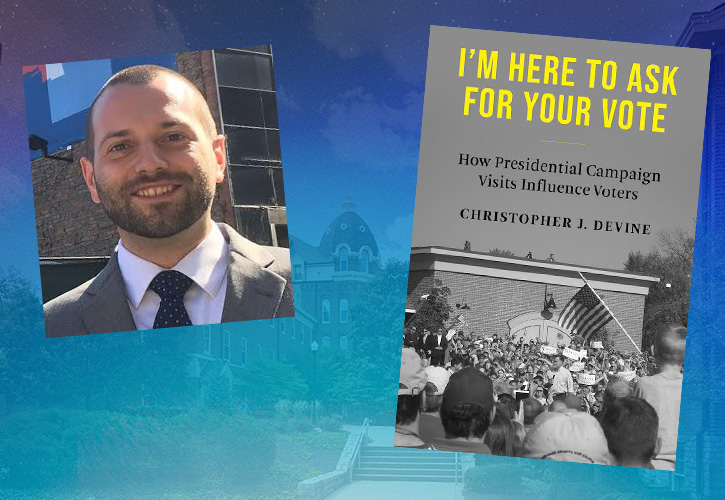College of Arts and Sciences Newsroom

UD political science professor looks at campaign visits in new book
By Meagan Pant
Don’t believe the hype about campaign rallies, says University of Dayton political scientist Christopher Devine in his new book. For all the talk about where presidential candidates are going (or not), campaign visits usually don’t win votes. Yet they are important in other ways.
I’m Here To Ask For Your Vote: How Presidential Campaign Visits Influence Voters provides an unprecedented analysis of where the candidates travel and what difference it makes, focusing on the 2008-2020 elections.
“People often think that campaign visits decide elections,” Devine explains. “What if Hillary Clinton had gone to Wisconsin? What if Joe Biden left his basement more often? My research shows that much of the conventional wisdom about campaign visits is just wrong. Most of the time, they don’t make a difference.”
In recent elections, candidates have tried to mobilize supporters with their visits. But Devine’s research shows they are actually more effective at persuading undecided voters.
“Campaign visits can be effective, but not in the way we might expect,” Devine says. “These are not just opportunities to rally the faithful. They are opportunities to reach beyond the party base and bring new voters into the campaign.”
Campaigns can also win or lose votes because of visits by their vice-presidential nominee, Devine finds.
And while there is no one way to know what would happen if one candidate skipped in-person campaigning altogether — notwithstanding the myth that Joe Biden never left his basement to campaign in 2020 — this would surely give an opponent the opportunity to gain votes by continuing to do so, Devine argues.
“Candidate visits appear to be an essential and permanent feature of presidential campaigning,” Devine writes. “There is something unique and profoundly democratic about a candidate taking time to ask the people, in person, for their votes. Will it make a difference? Judging by the evidence I present in my book, probably not. But the symbolism is important.”
